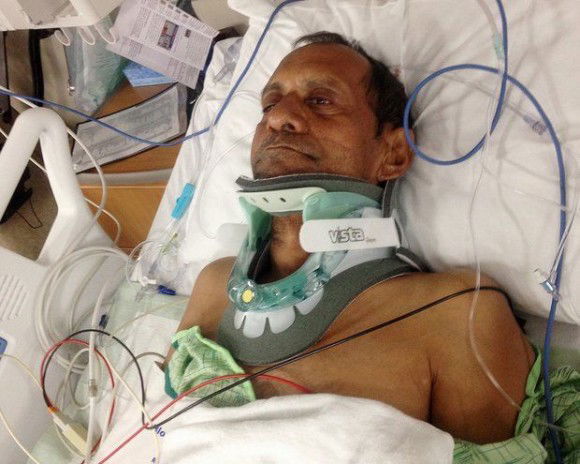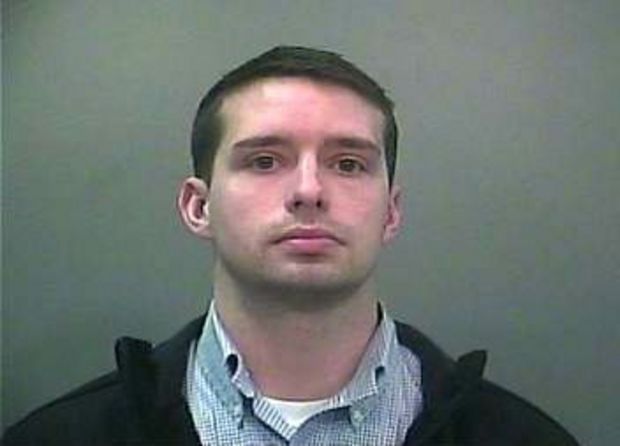America
Jury deadlocked in Sureshbhai case

The federal jury in the trial of a Madison police officer Eric Parker told the judge late Thursday afternoon that they had reached a stalemate and could not reach a verdict, al.com reported.
US District Judge Madeline Hughes Haikala sent the 12-person jury home for the evening, instructing them to return Friday at 9 a.m. and continue with their deliberations. Jurors must be unanimous to return a verdict.
The jury did not indicate to the judge how many jurors favored conviction over acquittal – the judge told the jury in her instructions before deliberations began not to ever inform her of how the jurors were voting.
The stalemate could be interpreted as good news for Eric Parker, the Madison police officer on trial for violating the civil rights of Sureshbhai Patel, according to he report. Parker's supporters wore smiles as they left the courtroom after hugging Parker.
Patel was left partially paralyzed after the takedown, which was captured on police video.
The jury began deliberations late Wednesday afternoon but because a jury was dismissed Thursday morning because of travel plans, the judge instructed the jury to begin deliberations anew with the addition of the alternate juror.
Excluding an hour for lunch, the new jury deliberated about five hours on Thursday before sending a note to Haikala about the deadlock.
If jurors cannot reach a verdict, a mistrial would be declared.
The note from the jury came 24 hours after they began deliberations Wednesday -- a day that included about three hours of testimony from Parker as well as closing arguments by the attorneys.
Parker told jurors that when he took Patel to the ground, there was no intent to injure him and that the officer lost his balance and fell along with the suspect onto the grass in a yard of the Madison subdivision.
"I lost balance and we fell," he said.
Parker remained cool under cross-examination from prosecutor Robert Posey and made a concerted effort to speak directly to the jury in explaining what happened on Feb. 6. His testimony included a step-by-step narration of the initial contact with Sureshbhai Patel as well as the takedown captured on video that left Patel with spinal injuries and partial paralysis.
"Unfortunately, he was hurt in the situation," Parker said of Patel.
Parker said he has taken suspects to the ground in similar fashion on numerous occasions and none of the suspects were ever injured.
Other highlights from Parker's testimony:
Patel gave several indications from his behavior that he posed a threat to Parker and the officer he was training, Andrew Slaughter. That included Patel repeatedly walking away from the officers when they approached to investigate possible trespassing as well as putting his hands in his pocket. Other signs were a distant stare by Patel and a tensing of his body.
Parker said he believed Patel understood English even though Patel told officers "No English." Said Parker, "I've had multiple subjects say 'No English.'" When Posey asked if there was a language barrier, Parker said, "There could have been. I still have to investigate."
Parker said he did not use a "leg sweep" to put Patel on the ground. "I never intended to leg sweep," Parker said. "It was not a leg sweep. I did not try to kick his legs. I fell and we went down. The media has portrayed it as a leg sweep and a lot of people refer to it. That was not my intention."
Patel pulled his left hand away from Parker four times, Parker said, while Parker was attempting to control Patel's hands. The fourth time resulted in the takedown. Parker said Patel's left hand was free when Patel was taken to the ground.
Throughout his testimony, Parker hammered the point that the actions he took were for officer safety.
"I have no idea he lived (in the area)," Parker said of receiving the call to respond to a call about a strange man lurking in yards and looking in garages. "Or he was a grandfather or he was 57 years old. I was called to investigate."
As for the issue of whether Patel understood English and could comprehend the questions Parker and Slaughter asked, Parker said, "People constantly try to deceive us. Officers get assaulted and killed taking that for granted."
During closing arguments, attorneys on both sides focused on assessing blame for the situation.
Parker and an officer he was training responded to a call to investigate a suspicious person on that Friday morning. The contact with Patel eventually saw Parker slam him to the ground because, Parker said, he was concerned for his personal safety as Patel reached into his pockets and repeatedly pulled away from the police officer.
"This was an escalated police action based on what Mr. Patel did," Parker's attorney, Robert Tuten, told the jury in closing arguments. "It's not a criminal matter. Eric Parker is not guilty."
Prosecutor Robert Posey told the jury that Parker's actions were criminal.
"It's unfortunate when a police officer commits a crime," Posey said. "He needs to be held responsible like everybody else. It's not Mr. Patel's fault there was escalating violence. That's just abuse."














































